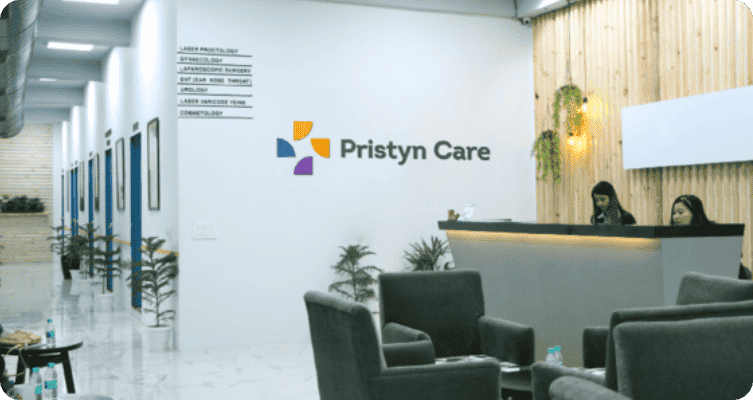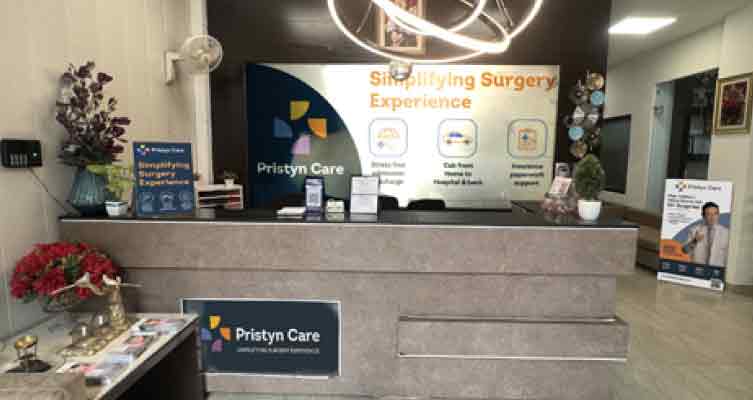
Delhi
USFDA Approved Procedures
Minimally invasive. Minimal pain*.
Insurance Paperwork Support
1 Day Procedure




Retinopathy of Prematurity Treatments Available
Retinopathy of prematurity is an eye condition that can affect infants born prematurely. In Delhi, Pristyn Care provides advanced treatments to manage this condition effectively.
Vitrectomy is a surgical procedure used for treating advanced stages of retinopathy of prematurity. In this operation, the doctor removes the vitreous gel from the centre of the eye. This gel can sometimes obstruct light from reaching the retina properly, especially in cases where there is retinal detachment. By removing it, the doctor can help reattach the retina and improve vision. This surgery is crucial for infants with severe ROP to prevent vision loss. The procedure takes place in an operation theatre under anaesthesia, ensuring the baby feels no pain during the surgery.
The scleral buckle procedure is another treatment for severe ROP where retinal detachment occurs. In this method, a flexible band made of silicone or sponge is placed around the eye’s outer layer. The band gently presses the eye inward, helping reattach the retina to its normal position. The pressure from the buckle allows the retina to heal and stay in place, which is essential for preserving vision. This method has been effective in managing advanced stages of ROP and is performed by specialists in a controlled medical setting.
Intra-vitreal injections involve delivering medication directly into the eye to manage abnormal blood vessel growth seen in ROP. These injections contain a medication that helps control such growth and can be an effective treatment for certain stages of ROP. The process is quick and typically done in a controlled setting like an OPD, ensuring safety and comfort for the infant. Doctors often use this treatment when laser therapy or other methods alone are not sufficient. It aims to reduce complications and improve long-term outcomes for affected infants.
ROP laser treatment uses laser therapy to manage ROP effectively. During this procedure, doctors utilise a laser photocoagulator to treat areas of the retina where abnormal blood vessels are developing. This precise treatment helps preserve central vision by preventing the abnormal growth from spreading across the retina. Laser treatment is typically performed when ROP has reached a stage where intervention is necessary to prevent significant vision loss. It is a well-established method that provides promising results in the care of premature infants with retinal conditions, effectively supporting the management of retinopathy of prematurity.
Delivering Seamless Surgical Experience in India
Your safety is taken care of by thermal screening, social distancing, sanitized clinics and hospital rooms, sterilized surgical equipment and mandatory PPE kits during surgery.
A dedicated Care Coordinator assists you throughout the surgery journey from insurance paperwork, to free commute from home to hospital & back and admission-discharge process at the hospital.
Our surgeons spend a lot of time with you to diagnose your condition. You are assisted in all pre-surgery medical diagnostics. We offer advanced laser and laparoscopic surgical treatment. Our procedures are USFDA approved.
We offer free follow-up consultations and instructions including dietary tips as well as exercises to every patient to ensure they have a smooth recovery to their daily routines.
Retinopathy of prematurity (ROP) is a condition that affects the eyes of premature babies. It involves abnormal growth of blood vessels in the retina, which can lead to vision problems.
ROP mainly affects babies who are born very early, specifically those born before 30 weeks or weighing less than 1.36 kg (3 pounds).
In premature babies, ROP happens because the blood vessels in their eyes do not develop normally.
There are five stages of ROP. Stages 1 and 2 are mild, while stages 4 and 5 are more severe, with stage 5 involving complete detachment of the retina.
A specialised eye doctor, called a paediatric ophthalmologist, checks for ROP during an eye exam because there are no obvious symptoms early on.
While you cannot always prevent ROP, steps like avoiding premature birth and keeping an eye on oxygen levels can help lower the chances.
Treatments for ROP include laser therapy, anti-VEGF injections, and surgery for more serious cases.
If not treated, ROP can result in serious vision loss or even blindness, especially in its advanced stages.
Catching ROP early is crucial, as it prevents significant vision problems and makes sure that treatments like ROP laser treatment are more effective.
Yes, if not treated in time, severe cases of ROP can result in blindness or major vision loss, underscoring the importance of premature baby retina care and retinopathy of prematurity management.
Retinopathy of prematurity (ROP) is a serious concern for premature infants, particularly those born before 31 weeks of gestation or weighing less than 1250 grams. Determining eligibility for ROP treatment involves several key factors:
Before starting treatment, doctors conduct thorough examinations to confirm the need for ROP management:
Treating retinopathy of prematurity involves halting the abnormal growth of blood vessels in the retina. Here’s what you can expect during the procedure:
Preparing for ROP laser treatment involves a few essential steps to ensure everything goes smoothly:
After undergoing ROP laser treatment, proper care is essential for a smooth recovery. Here’s what you can expect and how to support your child’s healing process: